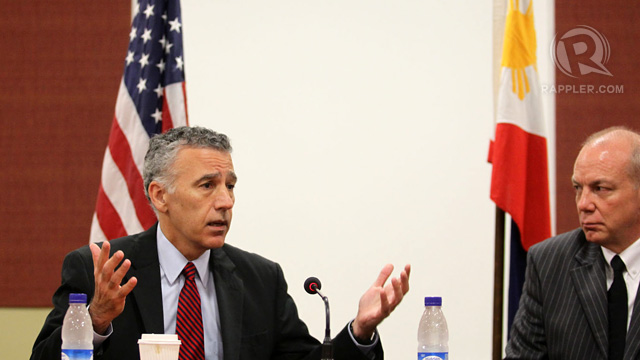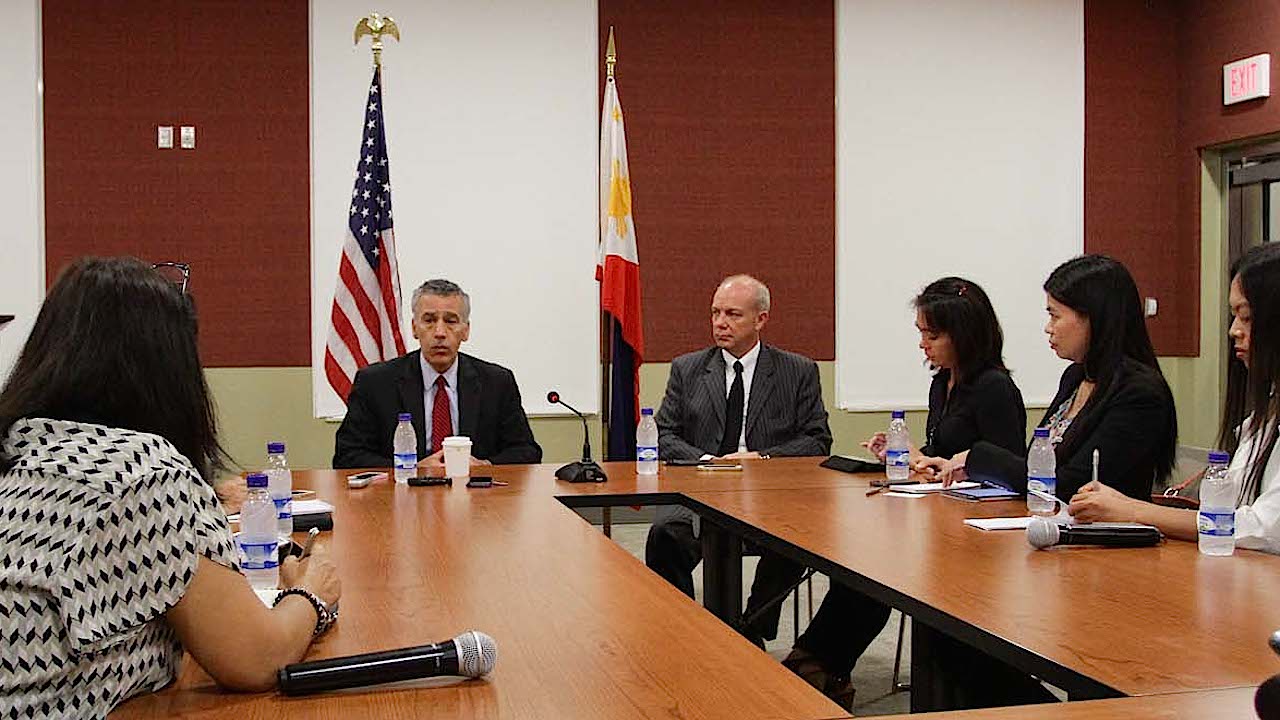Even before the death of Laude, the US has been talking with the Department of Foreign Affairs and the Department of National Defense to clarify – not amend – various aspects of the VFA

US Ambassador to the Philippines Philip Goldberg sat down with journalists to discuss the implementation of the Visiting Forces Agreement (VFA) in the wake of the killing of Filipino transgender woman Jennifer Laude allegedly by US Marine Private First Class Joseph Scott Pemberton.
The VFA gives
Philippine courts jurisdiction over erring American servicemen while custody
remains with the US Philippines
Even before the
death of Laude, the US
Rappler's Carmela
Fonbuena joined the roundtable with Goldberg on Friday, October 24. Here are
excerpts of the discussion.
On the
transfer of Pemberton to Camp
Aguinaldo
We need to always
be conscious of the feelings here among people. We took this step – allowing
within our custody under the VFA – a suspect to be moved to a sovereign
Philippine soil. It is an unusual step, one meant to build confidence that we
understand the situation here.
How is
this different from the 2006 rape case of former US
Marine Lance Corporal Daniel Smith, who was detained inside the US
I’m not going to
comment on the earlier case, the Corporal Smith case. But what I will say is we
went beyond, I think, our obligations under VFA by reaching an agreement with
the Philippines that allowed
the suspect to be moved to a facility at Camp
Aguinaldo that maintains the
principles of VFA – remaining under US
Will the US give the Philippines
We'll follow the
VFA and the VFA gives custody to the US US service person is involved, the US
Does the
transfer of Pemberton to Camp
Aguinaldo
We intend to
follow the VFA. And the US
Do you
consider this an ‘extraordinary case’?
I’m not going to
judge. Certainly it might be a question or an appeal. But I can tell you that
under VFA it is clear that the custody remains with the US
The US has the option to say yes or no to any
request from the Philippines
That is my
understanding.
How does
the US
I think the
judicial process includes the entire judicial process, the trial as well as the
appeal that might take place.

ROUNDTABLE DISCUSSION: US Ambassador Philip Goldberg says 'VFA as it is' should be followed in the case of US Marine Joseph Scott Pemberton. Photo by Mark Cristino/Rappler
On Justice
Secretary Leila De Lima’s statement that the executive branch is reviewing the
implementation of the VFA because of ambiguous provisions.
The Philippines US
We need to follow
the VFA at the moment. While we’re always open to talking to our friends and
allies about these issues, this shouldn’t be done in the middle of something
that we have to handle through rule of law. We can continue talking about it,
but it’s not part of this process. It’s part of the process between the
countries to clarify what these things mean. If the Philippines
wants to bring additional things to the table as the Secretary of justice
suggested, that’s the Philippines
On
proposals to abrogate the VFA.
I
can’t imagine abrogating VFA but i don’t want to get into a political debate
here. I took note that the President said, "No, it should not be." We
believe it should not be. From my point of view, it’s an agreement and it shouldn’t
be abrogated. It allows us to do something that’s important for both countries.
That is to ensure mutual security and to carry out exercises.
Last year in Leyte we were able to deploy as quickly as we did [in the
aftermath of Typhoon Yolanda] because we have a VFA. We wouldn’t put soldiers,
airmen, sailors, marines into a situation where there is no certainty about
process and what happens, and the rights and obligations. We do this all around
the world.
On the
involvement of the Naval Criminal Investigation Service (NCIS).
Our work to date
through the VFA has allowed us to identify the suspect, identify witnesses, to
cooperate and collaborate with the Philippine National Police. And quite
frankly I don't know if that would have happened if it hadn't been for our
cooperation with investigators from the NCIS.
This case may not
have been resolved as quickly or as effectively without our cooperation. That’s
a very important point. It is our obligation obviously, but it is also our
instinct. Our instinct is to actually pursue justice. i think most people who
know the US and the US
What
constitutes justice for Jennifer Laude?
Somebody is a
suspect at the moment and hasn’t been accused of a crime. What constitutes
justice is that if a crime occurs, that the person or people responsible are
found. I’m speaking hypothetically here because I don’t want to talk about a
particular person because nobody has been accused of anything at this point,
but that first, the facts are established. There is a judicial process that is
good and is according to law. Justice is served by finding the truth and
punishing those who are responsible for crimes. That is what we are committed
to doing in this or any other case.
On the
rights of the US
We’re sympathetic
to the Filipino people but we also have to observe the rule of law and our
obligations to a member of the US
How will
the case affect EDCA?
On EDCA, we have
an agreement and I understand it's before the Supreme Court here for
consideration on certain legal grounds. I'm really not in a position to comment
because it's in a court here. But it's a fully legal agreement as far as we are
concerned. We went to great lengths when we negotiated the EDCA to make sure
that the provisions of the EDCA from the Philippine side were constitutional.
But that’s for the court to decide, not for me or anyone else.
http://www.rappler.com/nation/73052-verbatim-philip-goldberg-us-embassy
No comments:
Post a Comment
Note: Only a member of this blog may post a comment.